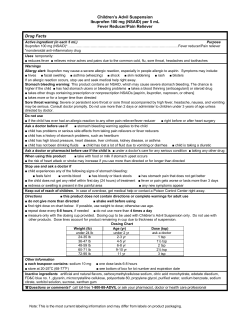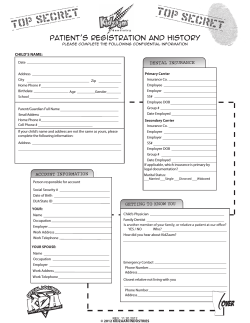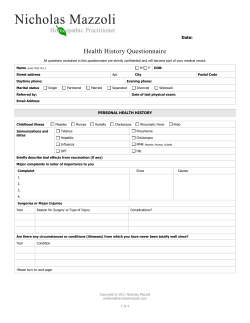
Fever What is a fever?
Fever What is a fever? A fever is the body’s way of fighting an infection. Fevers tell us something is ‘going on’ in your child’s body. Fevers often happen after vaccinations. Parents get very worried when their child has a fever, but how your child looks and acts is more important than the number on the thermometer. How do I know if my child has a fever? Babies under 3 months: A rectal temperature (in your child’s bottom) of 38° C (100.4° F) or higher means your baby has a fever. High Fever Your child (over 3 months) has a fever if the temperature is greater than: • 38.5° C or 101.3 ° F rectally • 38° C or 100.4° F by mouth • 37.5° C or 99.5° F under the arm Moderate Grade Fever See a doctor Low Grade Fever You can use a digital or glass thermometer. You can take your child’s temperature Normal rectally, by mouth (oral), or under the arm. Rectal temperatures are the most accurate. Temperature You can take your child’s temperature by mouth once she is about 6 years old. Do not use: • Ear thermometers (tympanic) • Electronic pacifiers • Forehead strips These thermometers do not measure temperature very well. Digital thermometers: are easy, quick and safe to use. Glass thermometers: use an alcohol based one (instead of one made with mercury). Before using, shake it to bring the line below the first number. Hold it in place for 5 minutes. To take a rectal temperature: • • • • Put a little petroleum jelly (Vaseline®) on the tip of the thermometer Hold your child’s legs up as if to change a diaper Place the tip of the thermometer 1 to 2 cm ( 1/2 to 3/4 of an inch) inside the rectum Hold the thermometer in place between 2 fingers, while you keep your hand flat against your child’s bottom. Support your child’s legs with your other hand. You can also place your child on his side. While you’re waiting, sing to your child, or have another helper hold a toy or book. To take a temperature by mouth: Usually, a child needs to be 6 years or older before he can keep the thermometer under his tongue. To take an underarm temperature: Place the tip of the thermometer under your child’s arm, in the centre of the armpit. Fº 108.0 106.0 104.0 103.0 102.0 101.3 100.4 99.5 98.6 Rectal Temperature Normal Reaction to fighting infection How do I take my child’s temperature? Cº 42.3 41.0 40.0 39.5 39.0 38.5 38.0 37.5 37.0 Will my child’s fever cause a seizure? In a small number of children, seizures sometimes happen when a child’s temperature goes up quickly. • Seizures due to fevers don’t happen often. • Seizures from fevers don’t cause long term problems. Call your family doctor if your child is: • Under 3 months with a rectal temperature over 38° C (100.4° F) • Very irritable (child cries when touched or moved) • Getting a rash • Not eating or drinking • Looking or acting very sick • Feverish for more than 3 days (72 hours) Bring your child to hospital if your child: • • • • • Has trouble breathing Can’t swallow Is confused Is very sleepy and hard to wake up Has not had a wet diaper in more than 8 hours How much should l give? Fever medicines come in different concentrations (the number of mg of medicine in each mL, tablet or suppository). Check the concentration on the bottle, and read the package directions carefully. My child’s weight ___________ Acetaminophen (Tylenol®, Tempra®, Panadol®, Atasol®) Dose: 10-15 mg/kg in 4 hours. No more than 6 doses in 24 hours. My child’s dose:_______ Ibuprofen (Advil®, Motrin®) Do not give to babies under 6 months of age. Dose: 10 mg/kg in 6-8 hours. No more than 4 doses in 24 hours. My child’s dose:________ Taking care of a child with a fever at home • Give fever medicine to keep your child comfortable, it will bring your child’s temperature down a little. • Repeat the medicine if your child still has a fever and is uncomfortable 4 hours after acetaminophen or 6 hours after ibuprofen. Make sure to follow the directions on the package. • Give extra fluids. Children lose a lot of water when they have a fever. • Dress your child lightly in one layer of clothing. Don’t wrap your child up in blankets. • No cool or alcohol baths. These can make your child shiver, and make the fever even higher. If you feel a bath would help your child, make sure the water is tepid, or at room temperature. Fever medicines Acetaminophen and ibuprofen will work well to bring down your child’s fever. Use acetaminophen instead of ibuprofen if: • Your child has a fever due to chicken pox • Your baby is under 6 months of age Do not use Aspirin® (ASA). Numbers to know Telehealth Ontario 1-866-797-0000 Health Information from Registered Nurses, 24 hours a day, 7 days a week TTY: 1-866-797-0007 401 Smyth Rd., Ottawa K1H 8L1 613-737-7600 • www.cheo.on.ca
© Copyright 2025





















